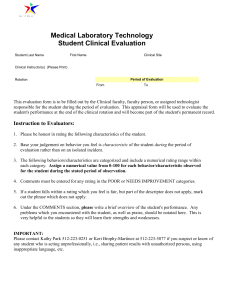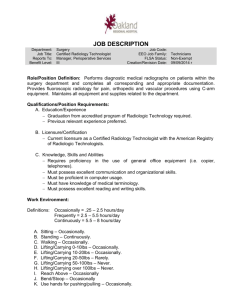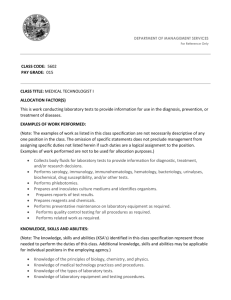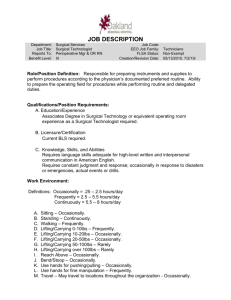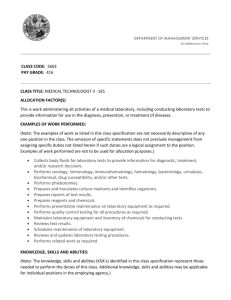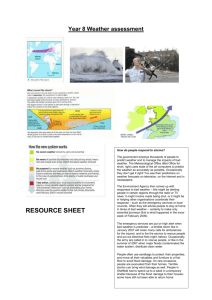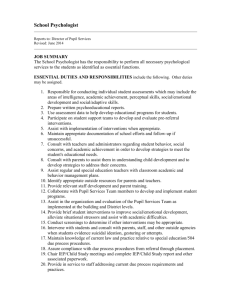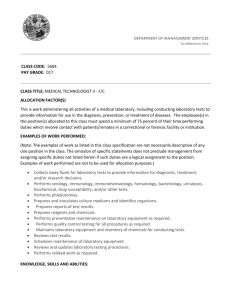Medical Laboratory Technology Student Clinical Evaluation
advertisement
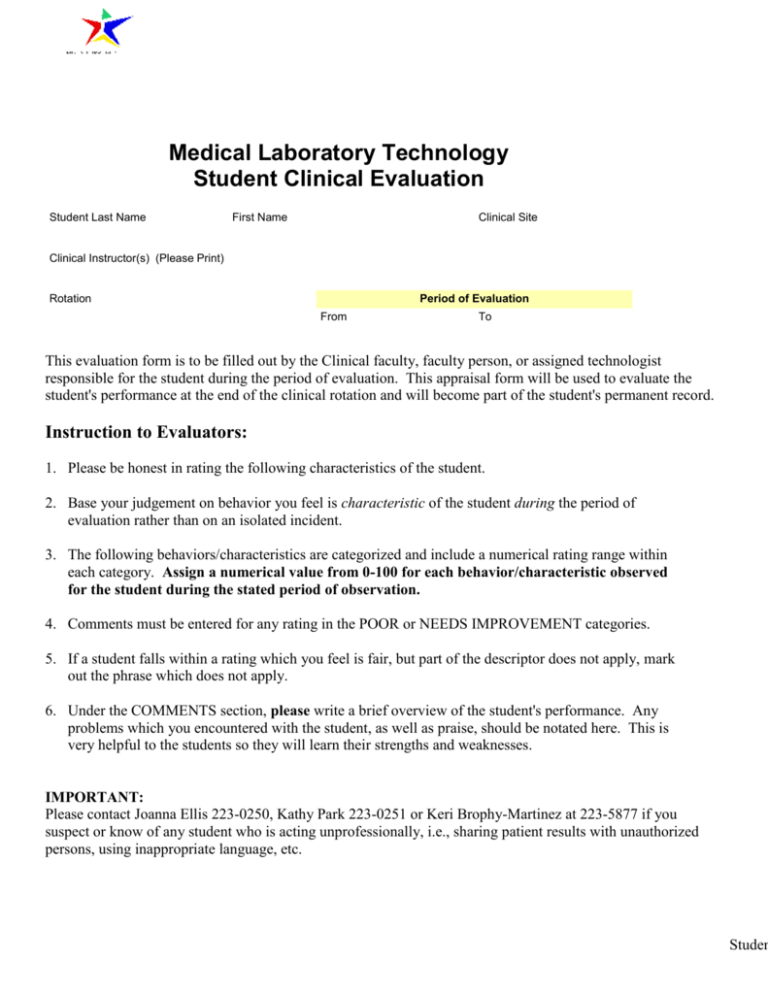
Medical Laboratory Technology Student Clinical Evaluation Student Last Name First Name Clinical Site Clinical Instructor(s) (Please Print) Period of Evaluation Rotation From To This evaluation form is to be filled out by the Clinical faculty, faculty person, or assigned technologist responsible for the student during the period of evaluation. This appraisal form will be used to evaluate the student's performance at the end of the clinical rotation and will become part of the student's permanent record. Instruction to Evaluators: 1. Please be honest in rating the following characteristics of the student. 2. Base your judgement on behavior you feel is characteristic of the student during the period of evaluation rather than on an isolated incident. 3. The following behaviors/characteristics are categorized and include a numerical rating range within each category. Assign a numerical value from 0-100 for each behavior/characteristic observed for the student during the stated period of observation. 4. Comments must be entered for any rating in the POOR or NEEDS IMPROVEMENT categories. 5. If a student falls within a rating which you feel is fair, but part of the descriptor does not apply, mark out the phrase which does not apply. 6. Under the COMMENTS section, please write a brief overview of the student's performance. Any problems which you encountered with the student, as well as praise, should be notated here. This is very helpful to the students so they will learn their strengths and weaknesses. IMPORTANT: Please contact Joanna Ellis 223-0250, Kathy Park 223-0251 or Keri Brophy-Martinez at 223-5877 if you suspect or know of any student who is acting unprofessionally, i.e., sharing patient results with unauthorized persons, using inappropriate language, etc. Studen Medical Laboratory Technology Student Evaluation Skill Poor to Marginal Needs Improvement 0-74 Average 75-79 Above Average 80-89 Excellent 90-100 1. Punctuality and Attendance Frequently late or absent and/or takes much too long at breaks. Occasionally late or absent and/or takes too long on breaks. Rarely late or absent and/or abuses break time. Never late or absent and/or does not abuse break times. 2. Initiative Not well prepared. Always needs help finding reagents and supplies. Procedures not read beforehand or not read thoroughly. Needs much help getting started. Never recognizes mistakes; corrective action initiated by clinical instructor. Basically prepared. Has a little trouble getting started. Reads procedures and requires help getting started. Sometimes recognizes mistakes and takes corrective action. Student comes to clinical prepared. Reads procedures thoroughly and performs with minimal help. Usually recognizes mistakes and takes corrective action. Student is a real self-starter. Comes to clinical prepared and ready to work. Reads procedures thoroughly before proceeding and performs with no help. Recognizes mistakes and takes corrective action when necessary. 3.Organizational Skills Poor. Wanted instructor to detail out everything to be done step by step. Very close supervision necessary. Slow getting started. Moderate confusion as to what to do first. Work progressed fairly smoothly once started. Average supervision needed. Good. Some confusion initially but work flowed very smoothly once started. Minimal supervision necessary. Exceptional. Had materials, supplies and specimens arranged so that work flowed smoothly. No confusion. Supervision unnecessary. 4. Technical Skills Procedures accomplished using improper technique; fails to organize equipment ahead of time; difficult timing and coordination; difficulty mastering new skills. Procedures generally accomplished using proper technique, but occasionally fails to organize equipment properly; minor problems with timing and coordination. Minor difficulty mastering new skills. Procedures performed using proper technique; equipment organized as procedure was performed; coordination and timing appropriate. Masters new skills easily. Procedures performed using excellent technique; equipment organized ahead of time; coordination and timing precise; masters new skills with great facility. 5. Recording Results Due to the number of clerical errors this student has made, he/she is at risk of compromising patient care. Occasionally makes a clerical error. Work is legible. Rarely makes a clerical error. Work is Never makes clerical errors. Work is neat and legible. extremely neat and legible. 6. Application Inability to apply knowledge of of Knowledge clinical significance to laboratory results. Cannot troubleshoot problem to determine additional testing necessary. Never brought abnormal results to my attention. Occasional inability to apply knowledge of clinical significance to laboratory test results. Usually needs help determining additional necessary testing. Occasionally brought abnormal results to my attention. Applies knowledge of clinical significance to laboratory results obtained. Occasionally needs help determining what additional testing is necessary. Almost always brought abnormal results to my attention. Demonstrates advanced application of results obtained to clinical significance. Identifies problems and performs additional testing when necessary. Always brought abnormal results to my attention. 7. Quantity of Work Does not complete work assigned at Performs a satisfactory amount of Performs more work than most times or performs the minimal amount work which is expected of a student at students at this level. Sometimes asks of work to meet objectives. this level. for additional tests to perform. Performs more work than most students at this level. Asks for additional tests to perform when possible. 8. Maintenance Usually does not restock work area, Usually restocks work area, puts of Work Area put supplies and reagents away. Work supplies and reagents away. Some and Supplies area is cluttered most of the time. clutter in the work area. Almost always restocks work area, puts supplies and reagents away. Very little clutter in work area. Assigned Grade Always restocks work area, puts supplies and reagents away, and/or washes glassware. No clutter in work area. Student’s Initials__________ Skill Poor to Marginal Needs Improvement 0-74 Average 75-79 Above Average 80-89 Excellent 90-100 9. Observing Laboratory Safety Does not exercise caution when handling biologic specimens. Does not wash hands most of the time. Often forgets to disinfect work area or clean up spills. Does not observe lab safety rules. At risk of contracting AIDS or hepatitis. Generally handles biologic specimens cautiously. Occasionally forgets to clean up spills, wash hands and/or disinfect work area. Has been found not observing lab safety rules. Handles biologic specimens with appropriate caution. Washes hands at appropriate times. Cleans up spills and disinfects work area when finished. Observes lab safety rules. Excellent technique in handling biologic specimens. Always washes hands at appropriate times. Always cleans up spills immediately and disinfects work area when finished. Always observes lab safety rules and works to assure the safety of others. 10. Professional Judgment Does not recognize own limitations; proceeds on own without checking with clinical instructor; overestimates abilities. Occasionally fails to recognize own limitations; occasionally fails to check with clinical instructor before proceeding; occasionally overestimates abilities. Recognizes own limitations; checks routinely before proceeding; seeks assistance when approaching limits of ability. Effectively carries out responsibilities within limits of ability; recognizes own limitations; routinely seeks clinical instructor advice and consultation. 11. Level of Knowledge Difficulty recalling and comprehending basic principles and procedures. Inadequate pre-clinical preparation. Needs improved knowledge base. Occasional difficulty recalling and Recalls, comprehends and relates comprehending basic principles and knowledge of basic principles and procedures and applying knowledge to procedures to actual laboratory work. actual clinical work. Recalls, comprehends and relates knowledge. Demonstrates advanced comprehension and application of basic principles and procedures to laboratory work. 12. Ability to Learn Assimilates information passively and indifferently. Lacks knowledge of assigned readings. Asks unnecessary questions. Has difficulty following directions/ instructions even with coaching. Must be closely watched, assisted or coached to fulfill test procedure requirements. Shows interest; asks few questions or asks unnecessary questions; demonstrates knowledge of assigned readings. Able to follow directions/instructions with coaching. Sometimes must be assisted/coached to fulfill test procedure requirements. Expands extra effort to read on problems encountered; asks many good questions; demonstrates knowledge of assigned readings. Often able to follow directions/ instructions without additional coaching. Fulfills test procedure needs or requirements as the test proceeds. Demonstrates independent learning effort; undertakes supplemental readings; is questioning, insightful and enthusiastic; participates in teaching discussions. Clearly able to follow directions/instructions without coaching. Easily anticipates test procedure needs or requirements (i.e., waterbath, pipets, etc.) 13. Attitude Fails to cooperate with others; unresponsive to criticism; and fails to respect others' professional roles. Generally cooperates with others; generally responsive to criticism; usually respects others' professional roles. Cooperates with others; responds readily to criticism and respects others' professional roles. Cheerfully and willingly performs all work assigned; seeks out input on performance; expends extra effort to cooperate with others; respects and complements others' professional roles. 14. Adaptability Cannot function in unexpected or stressful situations. Extremely flustered at these times. Able to function adequately in unexpected or stressful situations. Occasionally gets flustered. Functions well in unexpected or stressful situations. Rarely gets flustered. Excellent ability to function and perform under stressful or unexpected situations. Never gets flustered. Assigned Grade 15. How would you rate the overall level of performance of this student? (0 - 100) Total Student Points = ___________ = _________% Total Possible Points = 1500 Student’s Initials _______________ Overview of Performance: Please give a brief description of the student’s performance INCLUDING strength(s) and weakness (es). The comments are constructive criticisms to help the student identify areas which they are exhibit acceptable performance in and the areas in which, although the performance was acceptable, more work is needed. Evaluator's Signature Date Student's Signature Date (TO THE STUDENT: This document becomes part of your permanent file. Your signature is to verify that you have read this document and does not indicate agreement. Please initial each page of the evaluation.) Program Faculty Signature OR Program Director if Evaluation if grades are <75% Date Stu
